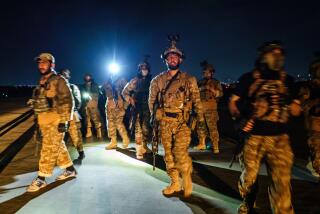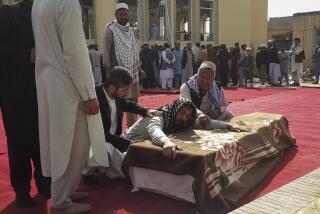In Kabul, Obama urges President Karzai to step up
- Share via
Reporting from Kabul, Afghanistan, and Washington — President Obama flew to Afghanistan’s capital Sunday evening and offered a tough message to President Hamid Karzai, urging that stronger action be taken to crack down on government corruption and to build respect for the rule of law.
Later in his six-hour unannounced visit, his first to the war-battered country since becoming president, Obama received a rousing welcome from American troops at the sprawling Bagram air base outside Kabul.
As midnight approached, camouflage-clad service members whooped and snapped pictures of the president, who dispensed hugs and handshakes before taking to the podium.
“I have no greater honor than serving as your commander in chief,” he told his audience to cheers.
Obama also emphasized the continuing American commitment to Afghanistan, where tens of thousands of new U.S. troops are to be deployed in coming months. “The United States of America does not quit,” said Obama, dressed in a leather bomber jacket. “We keep at it, we persevere and together with our partners we will prevail. I’m absolutely confident of that.”
The mood was more somber and formal when Obama met with Karzai and members of his Cabinet at the ornate presidential palace. Ties between the two leaders have been badly strained since last year’s fraud-tainted Afghan presidential election. At the Sunday night session, Obama invited Karzai to visit Washington this spring, and White House officials said a date of May 12 had been set.
Obama hailed Afghanistan’s progress in the years since the 2001 U.S.-led invasion that toppled the Taliban, but made it clear that much more must be done.
He said progress has been made militarily, but that “we also want to continue to make progress on the civilian process,” citing corruption, the rule of law, and agriculture and energy production, as well as good governance.
En route to Afghanistan, national security advisor James L. Jones told pool reporters aboard Air Force One that Obama would like to see Karzai use a merit-based system to appoint key officials and do a better job of fighting narco-traffickers.
Obama planned to “engage President Karzai . . . to make him understand that in his second term, there are certain things that have been not paid attention to, almost since day one,” Jones said, according to pool reports.
In brief remarks after his meeting with Obama, Karzai expressed “the gratitude of our people . . . for the help that America has given us for the past eight years.”
Obama last visited Afghanistan in 2008 as a presidential candidate, a trip that sparked great enthusiasm among Afghans. Many here cheered his election, believing Afghanistan would be a top priority of his presidency. That initial jubilation has waned somewhat as the war grinds on and daily life remains a struggle.
Afghanistan and neighboring Pakistan, a longtime sanctuary for Taliban fighters, are probably the largest foreign policy challenges of Obama’s presidency. He has ordered a troop buildup of tens of thousands of U.S. forces in Afghanistan and has pressed Pakistan to crack down on insurgents who hide there.
In December, Obama ordered a temporary deployment of 30,000 additional troops, which is still in its early stages. U.S. forces already have staged one major offensive since the buildup began, with Marines seizing the Taliban stronghold of Marja in Helmand province. But officials acknowledge that the real challenge will be winning the confidence of residents by establishing governance and security.
In coming months, American troops are expected to spearhead a much larger offensive in Kandahar province, the Taliban’s spiritual home. Kandahar city is Afghanistan’s second-largest, and the insurgency is firmly ensconced there.
Obama, who has struggled to build increased support among NATO nations for the Afghan war effort, expressed gratitude to coalition partners as well as American forces for their “incredible sacrifices.” Western troop deaths doubled in 2009 over the previous year, a trend that is continuing this year.
Security concerns dictated the secrecy of Obama’s trip, which was not announced until the president was on the ground in Kabul.
After an all-night flight on Air Force One, Obama arrived in Afghanistan shortly after 7 p.m. at Bagram, where he was met by Army Gen. Stanley A. McChrystal, the commander of Western forces in Afghanistan, and U.S. Ambassador Karl W. Eikenberry.
Obama was then shuttled by helicopter to the presidential palace in the city center to meet with Karzai and other senior Afghan officials. The thunder of the choppers filled Kabul’s night sky as Obama’s entourage passed over the capital.
Karzai and Obama emerged briefly from the presidential palace for a welcoming ceremony. At the parade grounds, the national anthem was played, and the two leaders reviewed Afghan troops.
After his boisterous session with the American troops, Obama met with McChrystal and Eikenberry.
McChrystal in recent weeks has begun sounding slightly more positive about the Western military effort, though U.S. Defense officials insist that they are not claiming that the country has begun to turn a corner.
Although important, the Marja operation is merely a preamble to the much bigger and more significant fight to improve security and governance in Kandahar.
A lengthy White House strategy review last year settled on a number of troops to send to Afghanistan this year, but it did not result in widespread agreement about McChrystal’s counterinsurgency strategy. Some administration officials would still prefer a strategy that focused more on hunting key Al Qaeda and Taliban leaders and de-emphasized the ground operations now being conducted.
Key to the planned Kandahar campaign is trying to reduce corruption in the provincial and local governments. At the center of that corruption, U.S. officials have insisted, is Karzai’s brother, Ahmed Wali Karzai, a provincial council leader. He is accused by U.S. and international officials of profiting from the drug trade, controlling agricultural production and selling jobs in the government and police, among other things.
U.S. officials believe the upcoming operation can work only if the Afghan president puts pressure on his brother.
The visit was a first step by Obama toward building a workable relationship with Karzai, said Frederick Kagan, a military analyst who has advised the U.S. command in Afghanistan. Kagan said that Obama did not need to establish the kind of regular contact Bush had, but that a better balance should be struck.
“There is a balance between not making it too personal and not having any relationship,” Kagan said. “It is important for the president to establish a relationship. But Karzai is not behaving well, so it is a very difficult thing.”
Stephen Biddle, a military analyst at the Council on Foreign Relations, said a presidential visit also increased the pressure on Karzai to act responsibly.
“You can have the ambassador and McChrystal weigh in, but this will be a hard sell,” Biddle said. “So bringing in the heaviest political artillery strikes me as appropriate.”
Also on the agenda Sunday, White House officials said, were Afghan efforts to reconcile with members of the Taliban. In recent weeks, administration officials, including Defense Secretary Robert M. Gates, have downplayed talk of peace negotiations, contending that progress must be made on the battlefield before such discussions can assume real importance.
Most Afghans were unaware of Obama’s nighttime visit, but some said it was long overdue. The White House said logistical problems, including weather, had frustrated previous plans for such a trip.
“Of course he should have come already,” Afghan lawmaker Shukria Barakzai said.
“This cold relationship has damaged the whole political process in Afghanistan. Whether or not the White House likes this president, the commitment to Afghanistan should remain the same from one administration to the next.”
But she added, “I’m very glad, and I’m not the only one to say so, that Obama came to Afghanistan. I hope this will be a new page for both countries.”
More to Read
Sign up for Essential California
The most important California stories and recommendations in your inbox every morning.
You may occasionally receive promotional content from the Los Angeles Times.










